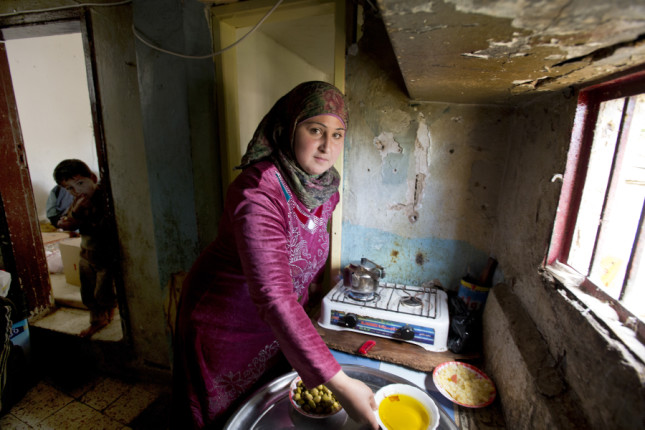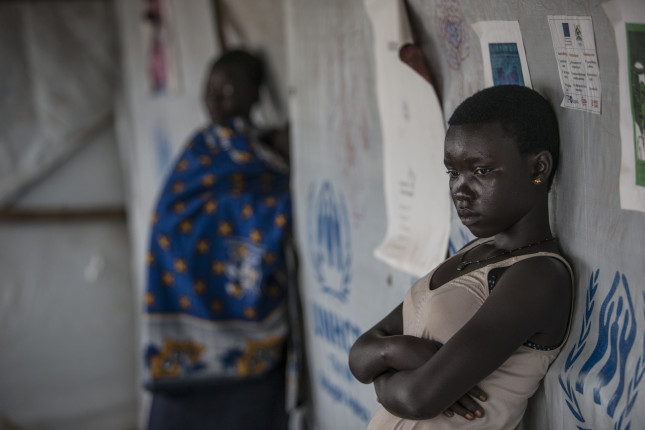-
Empowered Aid: New Toolkit Helps Detect and Prevent Sexual Exploitation and Abuse in Humanitarian Assistance
July 21, 2021 By Sara Matthews
Seventy-three percent of women and girls receiving aid at one food program in Uganda reported being afraid during at least one point in the distribution process, said Hope Harriet, Empowered Aid Research Manager. Harriet spoke at the launch event for Empowered Aid’s Toolkit for Planning and Monitoring Safer Aid Distributions. Empowered Aid is a participatory action research project focused on addressing sexual exploitation and abuse (SEA) in humanitarian settings and aid distribution. The project is led by the Global Women’s Institute (GWI) in partnership with CARE, the Union of Relief and Development Associations, the International Rescue Committee, and World Vision.
“If we think about distribution of aid, it’s one of the most clear examples of a transfer of power happening, and where people can abuse or misuse their power over others,” said Alina Potts, Research Scientist at GWI. Nevertheless, very little is known about the magnitude of sexual exploitation and abuse in humanitarian contexts, she said. Empowered Aid seeks to address this data gap. COVID-19 has further increased the need for aid and the vulnerability of women and girls, making this work even more critical, said Harriet.
The Empowered Aid Toolkit is based on data collected from women and girls receiving humanitarian aid in Lebanon and Uganda. Through focus groups and other participatory activities, these women were involved in all aspects of the project, from formulating research questions to creating final recommendations. “We went through the distribution cycle as refugees, so we know better than anyone the risks we face across distribution. Our role was to provide the solutions to problems we were facing,” said Potts, quoting one of the projects’ co-researchers in Lebanon.

The Empowered Aid Toolkit puts this research into action, providing recommendations for stakeholders before, during, and after aid distributions. Recommendations include making sure that distribution areas are well-lit, providing staff trainings, creating sex-segregated distribution lines, and following up with aid recipients about their experiences, said Loujine Fattal, Empowered Aid Research Manager in Lebanon. The toolkit also outlines four pillars — safety audits, point of distribution questionnaires, household surveys, and focus group discussion guides — to help stakeholders monitor and evaluate their efforts, said Amelia Reese Masterson, Research Consultant at GWI.
Empowered Aid’s country partners put these recommendations into action through several pilot programs. The results were promising, and perceptions of safety among women and girls increased. In Lebanon, partner organizations found the recommendation to implement door-to-door distribution especially helpful, as it minimized the risks women face traveling to distribution sites, said Tala Chammas, Empowered Aid Project Officer with CARE Lebanon. In Uganda, partner organizations saw such dramatic improvements that they have made several permanent changes to their operations, including ensuring that 65 percent of aid workers at future distribution sites are women, said Bryan Matsiko, MEAL Officer with World Vision.
Now, Empowered Aid is working to make the toolkit available to organizations worldwide. Considering the specific needs and challenges of women and girls will vary from country to country, the toolkit is designed to be adaptable, and researchers encourage stakeholders to tailor Empowered Aid’s resources to their community’s particular context, said Masterson. The best way to do this is to ask women and girls directly about their experiences. “Listening to affected people is a crucial first step to helping mitigate SEA risk,” she said. “Trust is built when they see their words put into action.”
Read More:
- How can we address gender-based violence in humanitarian settings?
- Gender-based violence in Latin America increases in the wake of COVID-19
- Engaging marginalized populations is necessary to achieving universal health coverage
Sources: CARE, Global Women’s Institute, the International Rescue Committee, Union of Relief and Development Associations, World Vision.
Photo Credit: Providing food vouchers in Lebanon to Syrian refugees (cover), Young South Sudanese girl strikes a thoughtful look while taking shelter from rain (in text) courtesy of Flickr user EU Civil Protection and Humanitarian Aid.
 A Publication of the Stimson Center.
A Publication of the Stimson Center.




